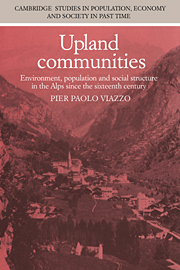 Upland Communities
Upland Communities Book contents
- Frontmatter
- Contents
- List of illustrations
- List of tables
- List of abbreviations
- Acknowledgements
- Introduction: anthropology, historical demography and the study of mountain societies
- 1 Environment, population and social structure: the Alpine village as an ecosystem
- 2 Open systems, open questions
- 3 Anthropologists in the Alps
- 4 The changing demography of Alpine communities
- 5 The traditional economy and its demise
- 6 The causes and consequences of Alpine emigration
- 7 The wealth from the earth: mining and immigration
- 8 Population, resources and homeostatic regulation
- 9 The domestic domain
- 10 Upland communities
- A summary of conclusions
- Bibliography
- Index
5 - The traditional economy and its demise
Published online by Cambridge University Press: 13 October 2009
- Frontmatter
- Contents
- List of illustrations
- List of tables
- List of abbreviations
- Acknowledgements
- Introduction: anthropology, historical demography and the study of mountain societies
- 1 Environment, population and social structure: the Alpine village as an ecosystem
- 2 Open systems, open questions
- 3 Anthropologists in the Alps
- 4 The changing demography of Alpine communities
- 5 The traditional economy and its demise
- 6 The causes and consequences of Alpine emigration
- 7 The wealth from the earth: mining and immigration
- 8 Population, resources and homeostatic regulation
- 9 The domestic domain
- 10 Upland communities
- A summary of conclusions
- Bibliography
- Index
Summary
The decline of mountain farming
The preceding chapter has suggested that in the study of recent trends in Alpine demography it is sometimes difficult to distinguish between short-term fluctuations and deeper structural transformations. On the other hand, it would seem hardly open to question that in the economic sphere the spectacular changes which have occurred in the last few decades, and particularly the decline of mountain farming, represent radical departures from the past. To be sure, villages where the majority of the labour force is engaged in farming still do exist, but they are much less numerous now than they were only twenty or thirty years ago. Moreover, these villages are the ones where mountain depopulation has been most pronounced. Swiss studies, corroborated by recent data on the Italian Western Alps, indicate that predominantly agro-pastoral communities now tend to have less than 300 inhabitants. If we further consider that people of prime working age are often outnumbered by pensioners, it becomes clear that in these villages the seeming stability of the occupational structure masks a crisis of agricultural and pastoral activities which is no less serious than in peasant-worker communities or in tourist resorts.
The census data used by geographers and economists in their analyses of post-war economic trends leave no doubt that in the last forty years the decline of mountain farming has been general (and, in all likelihood, irreversible) throughout the Alpine area.
- Type
- Chapter
- Information
- Upland CommunitiesEnvironment, Population and Social Structure in the Alps since the Sixteenth Century, pp. 100 - 120Publisher: Cambridge University PressPrint publication year: 1989


